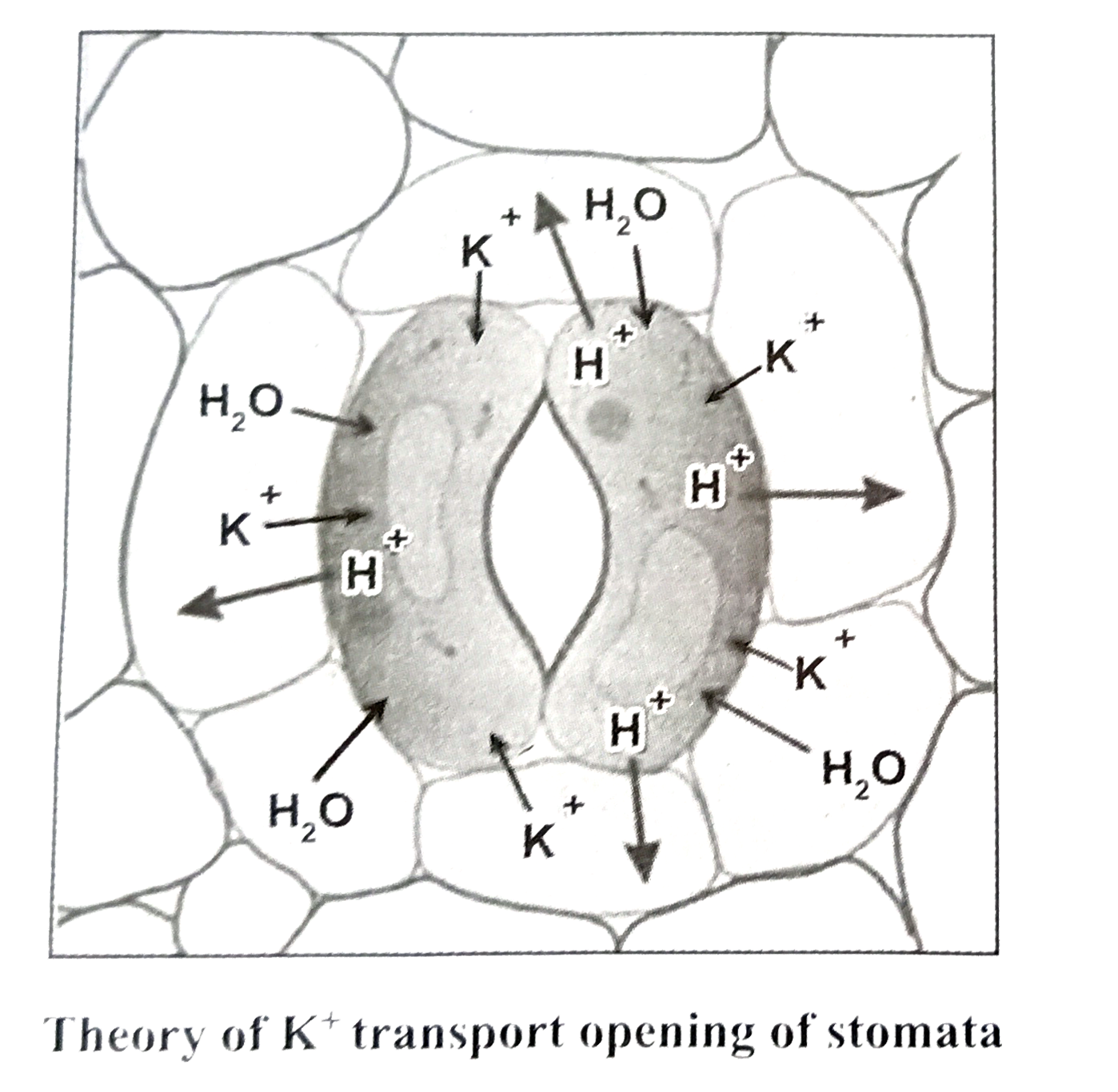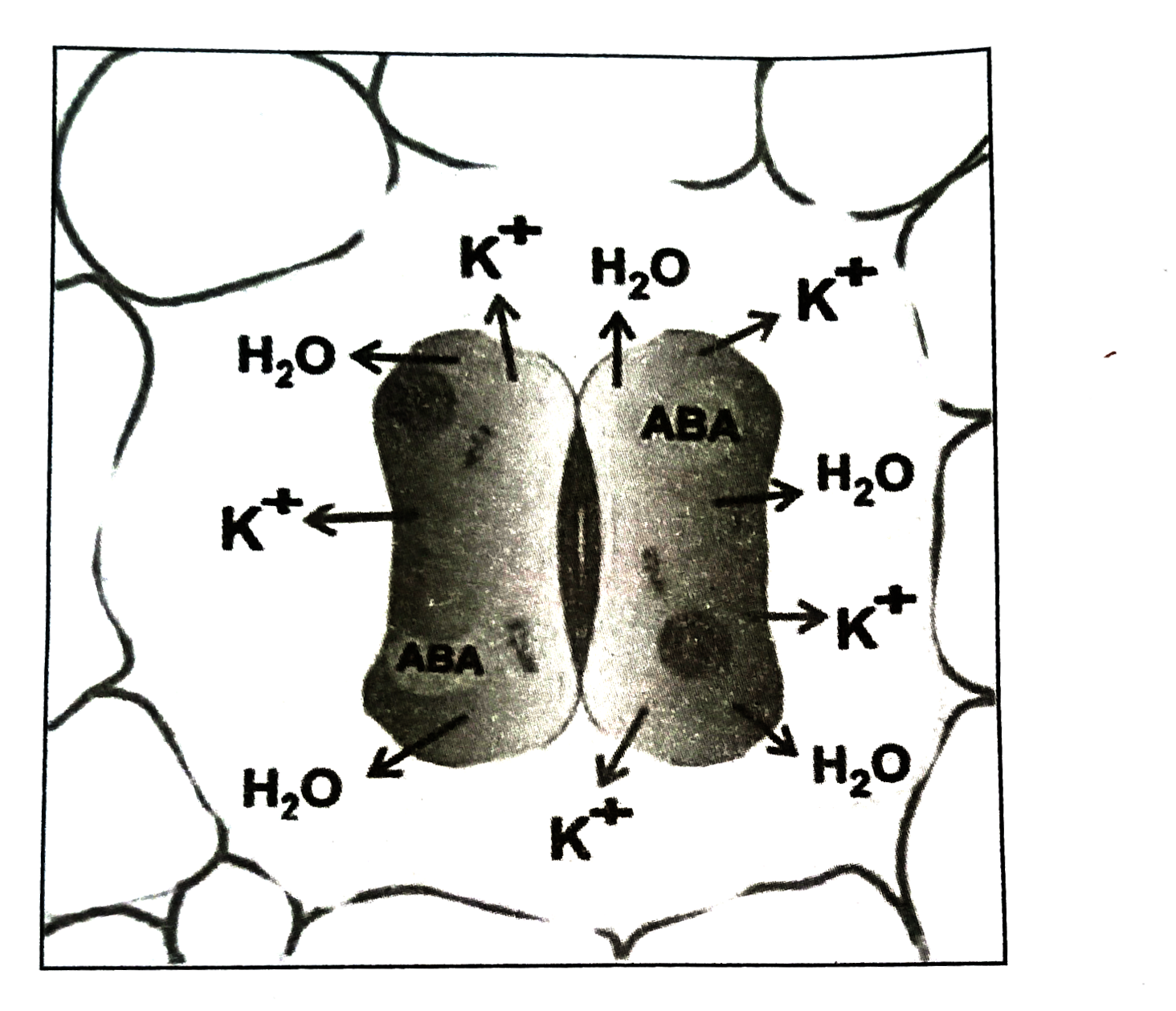Describe the K+ Transport theory on transpiration . Solution in Tamil
Theory of K+ transport theory was proposed by Levit (1974) and elaborated by Raschke (1975). According to this theory, the following steps are involved in the stomatal opening:

In light
i. In guard cell, starch is converted into organic acid ( malic acid).
ii. Malic acid in guard cell dissociates to malate anion and proton (H+).
iii. Protons are transported through the membrane into nearby subsidiary cells with the exchange of K+ ( Potassium ions) from subsidiary cells to guard cells. This process involves an electrical gradient and is called ion exchange.
iv. This ion exchange is an active process and consumes ATP for energy.
v. Increased K+ ions in the guard cell are balanced by Cl− ions. Incerase in solute concentration decreases the water potential in the guard cell.
vi. Guard cell becomes hypertonic and favours the entry of water from surrounding cells.
vii. Increased turgor pressure due to the entry of water opens the stomatal pore.
In Dark

Thoery of K+ transport Closing of stomata
i. In dark photosynthesis stops and respiration continues with accumulation of CO2 in the sub-stomatal cavity.
ii. Accumulation of CO2 in cell lowers the pH level.
iii. Low pH and a shortage of water in the guard cell activate the stress hormone Abscisic acid (ABA).
iv. ABA stops further entry of K+ ions and also induce K+ ions to leak out to subsidiary cell from guard cell.
v. Loss of water from guard cell reduces turgor pressure and causes closure of stomata.
Topper's Solved these Questions
- TRANSPORT IN PLANTS BOOK - FULL MARKSCHAPTER - TRANSPORT IN PLANTS EXERCISE - Additional Questions Solved (V). Higher Order Thinking Skills (HOTs))
6 Videos
- TRANSPORT IN PLANTS BOOK - FULL MARKSCHAPTER - TRANSPORT IN PLANTS EXERCISE - Additional Questions Solved (III. Short Answer Type Questions)
25 Videos
- TISSUE LEVEL OF ORGANISATION BOOK - FULL MARKSCHAPTER - TISSUE LEVEL OF ORGANISATION EXERCISE - ADDITIONAL QUESTIONS SOLVED (II. ANSWER THE FOLLOWING QUESTIONS)
17 Videos
- TRENDS IN ECONOMIC ZOOLOGYBOOK - FULL MARKSCHAPTER - TRENDS IN ECONOMIC ZOOLOGYEXERCISE - Additional Questions Solved ( Answer the following questions.)
99 Videos
Similar Questions
Why during rainy seasons, the wooden doors and windows are difficult to closs and open ? Give the phenomenon behind this and also define the phenomenon.
View SolutionDraw a Flow Chart illustrating various types of cell to cell transport .
View SolutionDefine tissues .
View SolutionWhat is Economic Zoology?
View SolutionDescribe transpiration pull model of water transport in plants. What are the factors influencing transpiration? How is it useful to plants?
View SolutionDescribe transpiration pull model of water transport in plants. What are the factors influencing transpiration? How is it useful to plants?
View SolutionDescribe transpiration pull model of water transport in plants. What are the factors influencing transpiration? How is it useful to plants?
View SolutionDescribe the transpiration pull theory .
View SolutionDescribe transpiration pull model of water transport in plants. What are the factors influencing transpiration? How is it useful to plants?
View SolutionDescribe transpiration pull model of water transport in plants. What are the factors influencing Transpiration? How is it useful to plants?
View SolutionDescribe transpiration pull model of water transport in plants. What are the factors influencing transpiration? How is it useful to plants?
View SolutionDescribe transpiration pull model of water transport in plants. What are the factors influencing transpiration? How is it useful to plants?
View SolutionDescribe transpiration pull model of water transport in plants. What are the factors influencing transpiration? How is it useful to plants?
View Solutionपौधों में जल परिवहन के लिए वाष्पोत्सर्जन खिचाव सिद्धांत (Transpiration pull theory) सबसे पहले किसने दिया था।
View SolutionTranspiration Pull theory|Transpiration
View Solution
